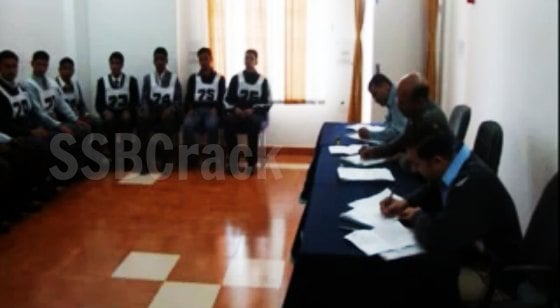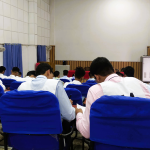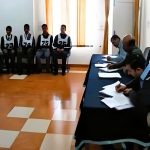The Services Selection Board (SSB) interview is a critical milestone for candidates aspiring to serve in the Indian Armed Forces. This comprehensive evaluation process is designed to assess a candidate’s potential, intelligence, and personality traits essential for a successful military career.
However, many candidates find themselves screened out during the initial stages, leading to disappointment and frustration. Understanding the common pitfalls can significantly enhance your chances of success. Below, we explore the ten primary reasons candidates often get screened out during the SSB interview.
1. Inattention During Briefings
Importance of Listening
The initial briefing conducted by the assessors is a pivotal moment in the SSB interview process. Candidates must pay close attention during this phase, as it establishes the foundation for the entire evaluation. Ignoring or failing to comprehend the instructions given can lead to unnecessary mistakes.
Consequences of Distraction
When candidates ask irrelevant questions or display ignorance about the process, it reflects poorly on their preparedness. Such behavior raises concerns about their ability to follow instructions, a vital skill in military operations.
Tips for Better Focus
- Take Notes: Jot down key points during the briefing to reinforce your understanding.
- Limit Distractions: Stay mentally present and avoid daydreaming.
- Ask Relevant Questions: If clarification is needed, ensure your questions pertain directly to the briefing.
2. Insufficient Preparation for Intelligence Tests
Understanding the Role of Intelligence Tests
The Officer Intelligence Rating (OIR) test evaluates logical reasoning, verbal, and non-verbal skills. Many candidates mistakenly assume that academic success alone will suffice for these tests, which require targeted preparation.
Common Mistakes
Candidates often underestimate the format and time constraints of these tests. A lack of familiarity can lead to poor performance, ultimately affecting the overall screening outcome.
Effective Preparation Strategies
- Practice Regularly: Utilize sample OIR tests to familiarize yourself with the format.
- Time Management: Work on solving questions under timed conditions to enhance speed.
- Seek Guidance: Consider joining study groups or coaching sessions focused on SSB preparation.
3. Weak Storytelling in PPDT
Understanding the Picture Perception and Discussion Test (PPDT)
The PPDT assesses a candidate’s ability to interpret visual stimuli and articulate a coherent narrative. Candidates are shown an ambiguous picture and must create a story based on their interpretation.
Pitfalls of Weak Narratives
A poorly constructed story can hinder a candidate’s chances. Assessors look for creativity, relevance, and critical thinking. Stories that are overly dramatic or unrelated to the picture can raise red flags.
Crafting a Strong Story
- Focus on Clarity: Ensure your story has a clear beginning, middle, and end.
- Stay Relevant: Base your narrative on elements visible in the picture.
- Practice Narration: Regularly practice storytelling to improve fluency and confidence.
4. Ineffective Group Discussion Skills
Importance of Group Dynamics
Group discussions are crucial in evaluating how candidates interact with peers. Effective communication and collaboration are essential in a military setting.
Common Group Discussion Errors
Dominating conversations or failing to contribute meaningfully can lead to negative impressions. Candidates must balance assertiveness with openness to others’ ideas.
Enhancing Group Discussion Skills
- Listen Actively: Pay attention to others’ contributions and build on them.
- Encourage Participation: Help quieter members share their thoughts to foster a collaborative environment.
- Maintain Composure: Stay calm and composed, even during heated discussions.
Also Read: 20 SSB Interview Questions For Freshers [With Sample Answers]
5. Lack of Confidence
The Impact of Confidence
Confidence plays a crucial role in the SSB interview. Candidates who appear nervous or unsure can be perceived as lacking the necessary qualities for military leadership.
Identifying Confidence Issues
Signs of low confidence may include fidgeting, avoiding eye contact, and speaking in a shaky voice. Such behaviors can undermine a candidate’s credibility.
Building Confidence
- Practice Public Speaking: Engage in activities that require speaking in front of others.
- Mock Interviews: Conduct practice interviews with friends or mentors to simulate the real experience.
- Positive Visualization: Visualize successful outcomes to help boost self-assurance.
6. Poor Communication Skills
The Importance of Clear Communication
Effective communication is vital in military operations. Candidates must express their thoughts clearly and concisely during the interview process.
Challenges Faced by Candidates
Many candidates struggle with articulating their ideas, leading to misunderstandings and miscommunication, which can significantly impact their overall evaluation.
Improving Communication Skills
- Engage in Discussions: Participate in group discussions to practice articulating your thoughts.
- Read Aloud: Reading books or articles aloud can help improve fluency and clarity.
- Seek Feedback: Request constructive feedback from peers or mentors to identify areas for improvement.
7. Negative Body Language
The Role of Non-Verbal Cues
Body language can convey confidence, interest, and sincerity. Negative body language, such as slouching or avoiding eye contact, can create a poor impression on assessors.
Identifying Negative Body Language
Candidates may not realize how their body language affects their communication. Inconsistent gestures or lack of eye contact can signal disinterest or insecurity.
Tips for Positive Body Language
- Maintain Eye Contact: Engage with assessors and peers through consistent eye contact.
- Stand Tall: Adopt an open posture to convey confidence.
- Use Gestures: Complement your speech with appropriate hand gestures to emphasize points.
Also Read: 50+ Personal Life Questions Asked In SSB Interview
8. Inability to Demonstrate Officer-Like Qualities (OLQs)
Understanding OLQs
The SSB assesses several Officer-Like Qualities, including leadership, teamwork, and decision-making. Candidates must demonstrate these traits throughout the interview.
Common Shortcomings
Candidates often fail to exhibit these qualities, leading assessors to doubt their suitability for military service. Inconsistent behavior or a lack of initiative can be detrimental.
Strategies for Showcasing OLQs
- Take Initiative: Volunteer for leadership roles in group activities.
- Collaborate Effectively: Show your ability to work well with others and respect differing opinions.
- Be Decisive: Practice making quick, informed decisions during discussions and activities.
9. Inconsistent Responses
The Importance of Consistency
Assessors look for reliability and integrity in candidates. Inconsistent answers or contradictory behavior can raise concerns about a candidate’s honesty.
Recognizing Inconsistencies
Candidates may inadvertently provide conflicting information during different stages of the interview, leading assessors to question their credibility.
Maintaining Consistency
- Reflect on Your Experiences: Be clear about your motivations and experiences to ensure consistent responses.
- Practice Common Questions: Prepare for frequently asked questions to reduce the chances of inconsistencies.
- Stay True to Yourself: Authenticity is key; avoid fabricating stories or exaggerating experiences.
10. Lack of Preparation
The Importance of Being Prepared
Many candidates underestimate the significance of thorough preparation for the SSB interview. Familiarity with the process can greatly enhance performance.
Common Areas of Unpreparedness
Candidates may neglect to research the SSB process, practice for tests, or prepare for potential questions, leading to poor performance.
Effective Preparation Strategies
- Research the SSB Process: Familiarize yourself with the structure and expectations of the interview.
- Practice Regularly: Engage in mock tests and group discussions to build confidence.
- Review Feedback: Seek feedback from previous candidates or mentors to identify areas for improvement.
Conclusion
Getting screened out during the SSB interview can be a disheartening experience for aspiring candidates. However, understanding and addressing the common pitfalls can significantly enhance your chances of success. By focusing on preparation, communication, and the demonstration of essential qualities, you can improve your performance and increase your likelihood of passing through the screening stage. Remember, the journey may be challenging, but with dedication and effort, you can achieve your goal of serving in the Indian Armed Forces.
You can also read a few posts of screening tests:
- Picture Perception & Discussion Test
- How to clear PPDT
- Best sample stories of TAT and PPDT
- Women oriented PPDT and TAT Pictures
FAQs
-
What is the SSB interview process like?
The SSB interview consists of various stages, including intelligence tests, personality assessments, group discussions, and personal interviews. Each stage is designed to evaluate different aspects of a candidate’s suitability for military service.
-
How can I prepare for the OIR test?
To prepare for the OIR test, practice sample questions, familiarize yourself with the test format, and work on your time management skills to improve speed and accuracy.
-
What should I do if I get nervous during the interview?
If you feel nervous, practice relaxation techniques such as deep breathing or visualization exercises. Engaging in mock interviews can also help build confidence and reduce anxiety.
-
How important is body language in the SSB interview?
Body language plays a crucial role in the SSB interview, as it can convey confidence, interest, and sincerity. Positive body language can enhance your overall impression on assessors.
-
What are Officer-Like Qualities (OLQs)?
Officer-Like Qualities are traits that the SSB looks for in candidates, including leadership, teamwork, initiative, and decision-making ability. Demonstrating these qualities is essential for a successful interview.













